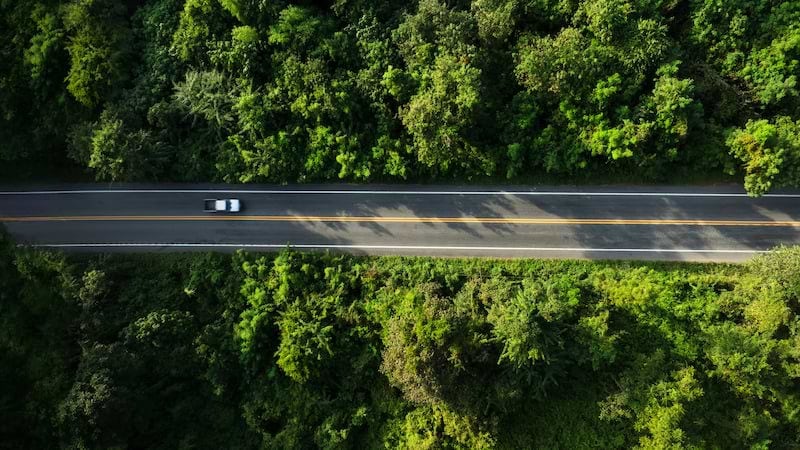
Our Environmental Ambition
Our environmental impact
Climate change is one of the most pressing challenges facing the world today as we witness its devastating effects, with global temperatures now at least 1.5°C above pre-industrial levels and emissions remaining at record-breaking levels. To combat climate change, we must accelerate our efforts to decarbonise. In order to achieve our net-zero ambition, PwC is proactively addressing climate change by setting ambitious GHG emission reduction goals and implementing decarbonisation strategies.


Our net-zero Ambition
Initially, our net-zero 2030 commitment centred on achieving a minimum of 50% absolute reduction in emissions for scope 1, 2 and 3.6 Business Travel, with the rest compensated through Carbon Removals. In alignment with updated SBTi and PwC Global guidance, this target now serves as our near-term commitment and is changed compared to previous years commitment where our focus was at least 50% absolute reduction of total emissions in 2030.
However, in January 2025, the Global PwC network has successfully obtained validation for our long-term net-zero ambition: net zero by 2050. This long-term target means that we reduce scope 1, 2 and 3 absolute emissions by 90% from a FY19 base by 2050. The residual emissions will be compensated through Carbon Removals. In addition, we will continue to offset those scope 1, 2 and scope 3 business travel emissions we cannot reduce today through high-quality carbon credits, and plan to transition our carbon credit portfolio to 100% carbon removals from 2029/2030. We regularly review the options and market solutions available to us to deliver on this.
For more information on our emission reduction goals, please refer to our latest annual report and our Climate Action Plan.
Our net-zero journey
In the publication 'Our Journey to net-zero', PwC reflects on their journey to net zero, highlighting all the milestones, initiatives, insights, results and lessons learned from 2006 to 2023. This publication has the aim to accelerate action and acts as a source of inspiration for other organisations on their sustainability journey. Would you like to know more about which measures you can take within your organisation? What tools are available in your organisations’ journey to achieve net-zero? Get in touch with us, or read our net-zero Journey publication to find out!

Where we want to make a difference
- Business travel
- Energy
- Carbon budget
Business travel
As an international company, it is important for us to think about the future of aviation. As part of this we are participating in the Anders Reizen Coalition (‘Travel Differently’). This coalition of large companies is working together with the objective of making their business mobility more sustainable. We also encourage sustainable innovation in aviation, including a financial donation to the Netherlands Aerospace Centre (NLR) for the purchase of an electric aircraft. We are proud to announce that our efforts in sustainable travel are recognized by the Netherlands Association for Travel Management (NATM), when PwC received the first edition of the Inspirational Sustainability Award (ISA) on February 24th 2025.
As of January 2022, colleagues at PwC Netherlands are flying entirely with biokerosene as source of Sustainable Aviation Fuel (SAF). This makes PwC the first large organisation to take this step. With this commitment, we are reducing our own CO2 emissions for business air travel and contributing to the future of sustainable paraffin.
Together with other companies, airlines and airports, united in the World Economic Forum's Clean Skies for Tomorrow Coalition, PwC aims to ensure that at least 10% of the world's jet fuel supply is sustainable by 2030. Are you interested to learn more about our initiatives, read more or get in touch via this link.
Next to our efforts for sustainability aviation, we aim to have a fossil-free vehicle fleet by 2025. By making fully electric vehicles the only choice for lease cars, we will phase out fossil fuel vehicles and replace the entire lease car fleet with electric vehicles by the end of 2025.
Energy
Within our offices, we have been working toward sustainability over the past years. We invested in the infrastructure in our Amsterdam office, in the construction of a new parking facility equipped with solar panels, and the installation of 100 additional charging points, all of which need to be finalised in 2026. We are also undertaking a comprehensive modernisation of the climate control system. By implementing more efficient technologies, we anticipate a considerable reduction in energy consumption, leading to a significantly smaller ecological footprint for the Amsterdam office. These initiatives help us minimise our environmental impact, transform our office into a Paris Proof workplace anddemonstrate our ongoing commitment to adopting sustainable practices across our operations.

PwC sets high sustainability standards for its office buildings. That means that we aim for stipulating energy label A or higher with all new housing contracts. All of our thirteen PwC offices are accredited with the BREEAM-NL sustainability label. In addition to energy, this label covers other sustainability issues such as health and biodiversity. All our buildings have a sustainability score of five out of five stars. If we rent office space, we require the property owners to have the office accredited with BREEAM-NL within six months.
Sustainable energy usage in our offices
Carbon budget
An effective way to reduce CO2 emissions is to assign a price to them. We even take this a step further: the price of our emissions in the previous year, directly forms our sustainability budget for the upcoming year. We use the price of €100 per CO2 tonne. This amount is based on a study by the Netherlands Bureau for Economic Policy Analysis (CPB). It also includes social costs, which raises it above the market price for CO2 offsets. For our actual expenditure and investments, please refer to the sustainability statement in our latest annual report.
Next to our carbon budget, we also focus on sustainable procurement, which means we have a sustainable procurement policy in place. This policy establishes sustainability principles for our procurement processes to reduce our CO2 emissions from purchased goods and services.

EcoVadis Platinum Certificate
In November 2024, PwC the Netherlands received the EcoVadis Platinum Certificate, placing us among the top 1% of the world’s most sustainable companies. We’ve been assessed by EcoVadis since 2013, improving our score from 59 to 86. EcoVadis is a global leader in sustainability ratings, having assessed over 130,000 companies. It evaluates performance across four areas: environment, labour & human rights, ethics, and sustainable procurement. PwC scored especially high in ethics and labour & human rights (90/100), followed by environment (80) and sustainable procurement (70).
Contact us

Wineke Ploos van Amstel - Haagsma
Chief Sustainability Officer, PwC Netherlands
Tel: +31 (0)65 170 13 44




















